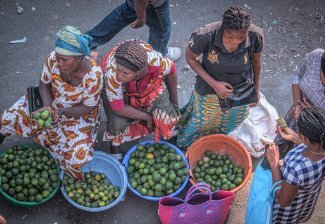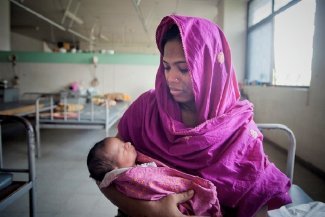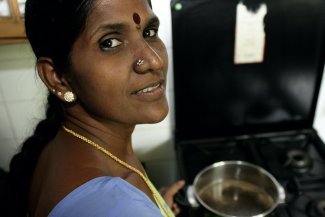Chukudeurs, the drivers of the wooden bicycle-cum-scooter used to transport heavy loads, join together in local groups to support each other in times of need.
In April 2020, Vunalungu Pépé, a 70-year-old government official, suffered a stroke and found himself partially paralysed on the right side of his body. He was quickly taken to the Kyeshero Urban Mutual Health Centre in North Kivu, eastern Democratic Republic of Congo (DRC), where he was cared for by a medical team. “I would never have been able to pay for this care if I hadn’t been enrolled in a local social security scheme,” he says. Like many others, he would have been sent home and left to hope that his stroke and its effects would take care of themselves. As the sad old adage about Congolese hospitals goes, it would have been a case of “no money, no care”.
“The Congolese health system is hugely lacking,” explains Dr Jean-Bosco Kahindo, a public health doctor who is regularly consulted by the government and international organisations. “There are many problems, but one of the most important is the absence of health cover for patients who cannot afford to pay their medical expenses.”
The country does have a legal framework, but it remains largely theoretical: less than 10 per cent of the Congolese population actually has health cover worthy of the name, according to the doctor. The main difficulty lies in the high proportion of people in informal work: over 81.5 per cent. These workers do not contribute to the country’s social protection system, the National Social Security Fund (CNSS), and do not therefore receive any assistance. The average life expectancy in the country, just 62 years, illustrates the consequences of this shortfall.
Local alternatives being developed
“The situation is all the more problematic when it comes to social security, as many workers are unable to save for hard times,” says Tchernozem Kambale, the president of the UNTC, Congo’s largest national workers’ union. “Incomes are often far too low for people to be able to manage their healthcare individually. But solutions are emerging on various fronts, based on worker solidarity, to fill the gaps left by the state.”
It is a shift that is in line with the International Labour Organization’s (ILO) commitment to promote access to health insurance systems and, more broadly, social protection. The ILO considers access to such protections as a human right, while underlining that there is no single social security model, and it is up to each state to develop the protection required.
Various sectoral approaches have emerged in the DRC, with several professions attempting to respond to the absence of health cover. One such case is the motorbike taxi drivers, who are particularly vulnerable to the risk of accidents. Cotam, a motorbike taxi drivers’ collective, has set up a solidarity system within the profession. It is currently in place in 15 of the country’s 26 provinces and the plan is to extend it to the rest of the country. “We have set up a solidarity system,” explains Shebankoy Kitsa, vice president of Cotam. “Our members contribute 2,000 Congolese francs a month (around €1). This allows us to generate a fund that can be mobilised in case of an accident or health problem.” It is not enough to fully cover a sick or injured person’s needs, but Cotam sees it as a good starting point. “And for the time being, we cannot ask more from our members, as many of them would not be able to afford it,” concludes Kitsa.
Other professions have followed suit. Chukudeurs, the drivers of the wooden bicycle-cum-scooter designed to carry heavy loads, have set up similar systems on a local level. The aim is to cover them in case of accident or illness, and to support their families when needed, if one of their wives experience complications during childbirth, for example. Women traders have also developed such schemes, albeit on a similarly small scale.
Trade unions are also trying to develop solutions for their members. The UNTC offers paid-up members 50 per cent of the cost of care in a number of partner hospitals and health centres. The system nonetheless has its limits, set by the union’s financial means. The most serious cases, which require the patient to be transferred abroad, cannot be covered.
Solutions reliant on external assistance
To scale up these solutions, the Congolese government is trying to secure support from international donors. In North Kivu, a Belgian NGO, ULB-Cooperation, is coordinating the Padiss programme (Support Programme for the Integrated Development of the Health System), in cooperation with the region’s health authorities. One of the initiatives is to help them set up a health insurance system adapted to the local context.
“We realised that one of the main barriers to health care access is the financial factor,” explains Dr Edgard Musubao, the NGO’s technical assistant. “And so, we conducted a study to determine what the local population could reasonably pay on their own and we developed a system of fixed consultation fees: US$2 for a child and US$5 for an adult. The patient only pays for the first consultation, which covers any subsequent care arising from it.” The results have quickly proven successful, with many patients now turning to this system rather than self-medicating or foregoing care.
Such successes have a wider impact on society, a fact highlighted by ILO researchers, who point out that effective social security systems contribute to preventing and reducing poverty and inequality. It was with this in mind that, in 2012, the International Labour Conference adopted a new instrument: Recommendation 202 on Social Protection Floors, which provides guidance for establishing or maintaining social protection floors, to inspire states to develop systems tailored to their circumstances.
The drawback of the system being developed in DRC, however, is its reliance on external funding. In the case of Padiss, the difference between the amount paid by the person insured and that charged by the health centre is covered by a European Union cooperation programme. “To have social coverage that works in the long term, the government must be able to raise funds and allocate them to social protection. Increasing the number of employees in the formal sector is part of the work that has to be done to broaden the state’s tax base and thus increase the resources available to it,” says Kahindo.
Social coverage across the whole country
Increasing the number of workers able to contribute is at the heart of the problem. “The law passed in 2016 makes significant steps forward, such as opening up to the informal sector, which could help build a broader base of contributors to the social protection system,” says Joséphine Shimbi Umba, of Congo’s CSC trade union confederation. “Unfortunately, we are still waiting for the implementing measures to be adopted at the National Labour Council (CNT) so that the law can be applied at operational level. Then, action will be needed to build awareness of the system. The CSC is already working in this direction, by inviting representatives of the CNSS to inform our members about the law, because setting up a social security system worthy of the name must be a priority for our country.”
The trade unionist also points out that the low margins earned by informal sector workers means they struggle to contribute to a social security scheme. The country’s unions hope that their policy of organising workers will gradually enable them to leave the informal sector, which is the only way to lay the foundations of a social protection system. But the difficulty in moving out of informal employment means there is still a long way to go, especially in light of the countless problems that urgently need addressing to lift informal workers out of extreme vulnerability. For the time being, the country’s trade unions are taking a small steps approach that allows rapid progress to be made on the most urgent problems facing workers.
There is a political will to move forward on this issue. In 2016, a law was passed to set out the rules for a general scheme capable of offering minimum protection to all Congolese citizens via the National Social Security Fund (CNSS). Pending the publication of implementing measures to extend the scheme to a larger number of workers, the organisation’s management is working on training its staff. It is as much about maximising revenue collection as it is about ensuring the payment of entitlements to the beneficiaries.
The new director general, Charles Mudiayi, aims to position the CNSS as “one of the leading social security institutions in Africa”. But much remains to be done. “Less than 10 per cent of Congolese citizens benefit from it,” Kahindo points out. And the beneficiaries are not always satisfied, due to the inadequacy of the amounts awarded and the delays in their payment. One of the key challenges is securing the funds required to meet the needs of the population.
In addition to the difficulty of raising funds, there is a lack of trust in government institutions. A study led by Kahindo looks at the possibility of organising a social security system at national level. “Many local health actors and trade unions are interested and consider it possible. But for them, it has to be decentralised: they don’t have faith in a system where all the contributions go through an organisation based in Kinshasa, as the authorities want. They fear seeing their contributions leave and never coming back. This significant lack of trust in public institutions represents an added difficulty in setting up a health insurance system that covers the whole country,” he concludes. This is hardly surprising in a country ranked 166 out of 180 in Transparency International’s Corruption Perceptions Index.













